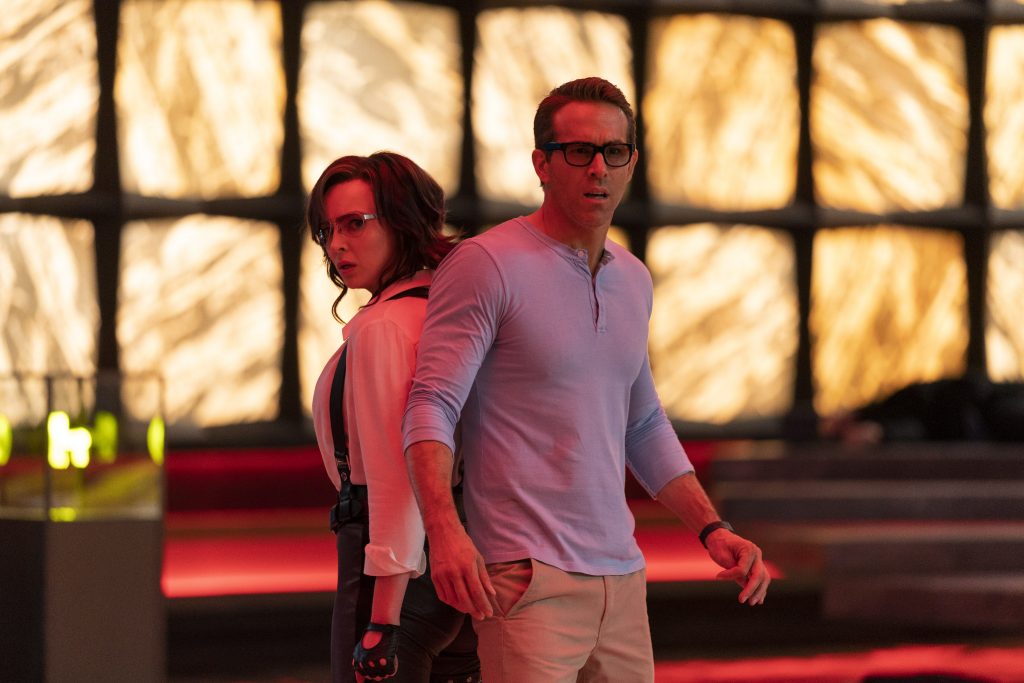June 13, 2022
by Carla Hay

Directed by Angus MacLane
Culture Representation: Taking place in various part of the universe, the animated film “Lightyear” features a predominantly white cast of characters (with a few African Americans, Asians and Latinos) representing people and robots connected in some way to travel in outer space.
Culture Clash: In this prequel to the “Toy Story” movies, heroic astronaut Buzz Lightyear tries to make things right when he causes an accident that strands several human beings on a foreign planet that is frequently under attack.
Culture Audience: Besides appealing to the obvious target audience of “Toy Story” movie fans, “Lightyear” will appeal primarily to people interested in animated films about time travel in outer space, but should be prepared for a plot that’s more convoluted than the average family-oriented animated film.

In the animated film “Lightyear,” the plot about time travel in outer space often gets messy, but the movie has good messages about teamwork and confronting the past without dwelling on the past. The movie’s title character is astronaut Buzz Lightyear, who became the basis of a talking toy character that is one of the main stars of the “Toy Story” series. “Lightyear” is the movie that shows his origin story and shows why the movie resulted in Buzz becoming a popular toy. It’s a “movie within a movie” premise that has some stumbling blocks, but it works out well enough to be entertaining overall for people who enjoy animated films that take place in outer space.
Directed by Angus MacLane (who co-wrote the “Lightyear” screenplay with Jason Headley), “Lightyear” could easily be a stand-alone movie that doesn’t require anyone to see any of the “Toy Story” films. That’s because, with the exception of Buzz and villain Emperor Zurg (who was first seen in “Toy Story 2”), all of the characters in “Lightyear” are being introduced to movie audiences for the first time. Tim Allen is the voice of Buzz in the “Toy Story” movies. Chris Evans is the voice of Buzz in “Lightyear,” which depicts a young-man version of Buzz in the beginning of movie. It’s a seamless transition, considering that the Buzz in “Lightyear” is not really the same Buzz who’s in the “Toy Story” movies.
The opening scene of “Lightyear” shows that Buzz is part of an exploratory mission in outer space where he and his fellow astronauts from Earth visit other planets in a spaceship nicknamed The Turnip, because Buzz thinks the ship looks like a “root vegetable.” The Turnip has an on-board computer called IVAN (voiced by Mary McDonald-Lewis), which has the type of artificial intelligence that can have conversations with people. Buzz is an astronaut called a Space Ranger, whose duties including peacekeeping and law enforcement in the universe.
Buzz and his commander Alisha Hawthorne (voiced by Uzo Aduba) are part of a crew of more than 1,000 scientists and technicians who are heading back to Earth for what they think has been a successful mission. They are about 4.2 million light years away from home when disaster strikes. Their space vessel picks up a signal that there’s a new planet called T’Kani Prime that hasn’t been explored yet for possible untapped resources. Buzz becomes curious about this unknown planet, so he makes the fateful decision to take a detour to visit T’Kani Prime.
The explorers find out too late that it’s an extremely hostile planet with dangerous vines and giant bugs that attack. While under attack, The Turnip sustains some damage, including damage to the hyper-speed crystal that allows the ship to travel to other dimensions. Buzz, Alisha and most of their crew survive, but they are now stranded in this strange and unwelcome world.
Up until this point, Buzz was an overconfident (and some might say arrogant) Space Ranger. However, he feels humility and tremendous guilt over his colossal error in judgment. He vows to make things right and to find a way to get everyone back home to Earth. But the hyper-speed crystal keeps malfunctioning and isn’t working at the speed it used to have. Buzz worries that this malfunction might leave everyone permanently stranded.
After every attempt to use the malfunctioning hyper-speed crystal with The Turnip in outer space, a dejected Buzz has to return back to T’Kani Prime. However, he finds out the first time this happens that four minutes of his time in outer space equal four years of time on T’Kani Prime. And so, every time Buzz comes back from a failed hyper-speed attempt, years have passed, while Buzz does not age at that same pace. Buzz also finds out that the faster he flies into outer space, the further into the future he travels.
After one of his early attempts to get back to hyper speed, Buzz returns to T’Kani Prime and is assigned a cat robot named Sox (voiced by Peter Sohn), who is described in the movie as an “emotional transition robot.” Sox is intuitive and acts as an all-around helper for physical tasks, getting encyclopedia information, and offering words of advice and comfort. During a few of the action scenes, Sox also has a recurring catch phrase/joke about buying time to stall any antagonists in the scene.
Buzz finds out after coming back from a failed hyper-speed trip that Alisha has fallen in love and gotten engaged to a female crew member named Kiko. He’s happy for the couple, but he also feels sad that the lives of other people are passing him by, and he still hasn’t found a way to get everyone back to Earth. Buzz’s frustration at not being able to achieve his goals as quickly as he thought he would is the movie’s obvious message about how life can have unexpected setbacks.
As shown in a montage sequence, Alisha and Kiko get married, and they have a son together. Their son gets married and has a daughter named Izzy (voiced by Keira Hairston), who from a young age, has been determined to follow in her beloved grandmother Alisha’s footsteps as a commander Space Ranger. As for what eventually happens to Alisha, that’s easy to predict, considering that T’Kani Prime is not a planet that can stop the aging process.
None of this is really spoiler information, because the majority of “Lightyear” is about what happens when Buzz ends up going on a mission with Izzy when she becomes a young woman (voiced by Keke Palmer) and other members of a motley crew of explorers. (This plot is in the “Lightyear” movie trailers.) What happened to cause this mission?
The stranded community’s gruff new commander Colonel Burnside (voiced by Isiah Whitlock Jr.) abruptly informs Buzz that Buzz’s most recent mission was his last one, because the program is being shut down. As part of the shutdown, Sox will be decommissioned and probably become part of a robot scrap heap. The stranded scientists have built a laser dome over their community for protection, because they’ve resigned themselves to thinking that they might never be able to leave T’Kani Prime—at least not in their lifetime.
Colonel Burnside orders that Sox get taken away from Buzz. However, Buzz can’t bear the thought of Sox “dying,” so he escapes with Sox in The Turnip. Through a series of circumstances, Buzz and Sox come back to T’Kani Prime, 22 years later. Izzy is now a young woman who’s part of a group of wannabe Space Rangers called the Junior Zap Patrol. And the planet has come under attack by giant robots, led by an entity named Emperor Zurg (voiced by James Brolin), who is somewhat of a generic villain.
Guess who’s going on a mission to save the planet and possibly the universe? Buzz and Sox join forces with Junior Zap Control members Izzy, goofy Mo Morrison (voiced by Taika Waititi) and sarcastic Darby Steel (voiced by Dale Soules) to often awkward results. That’s because the Junior Zap Control is untrained and often incompetent. And even though Izzy wants to be a Space Ranger, she’s terrified of being in outer space.
“Lightyear” has a few surprises, but the movie mostly sticks to a familiar formula in “heroes who save the world” sci-fi/fantasy stories. One of the movie’s greatest strengths is that it introduces characters with memorable personalities and quirks, with Sox being the one that viewers might be talking about the most. Some viewers might think Sox is adorable, while other viewers might think Sox is annoying. Either way, this character was clearly designed by the “Lightyear” filmmakers to sell Sox toys and other merchandise in the real world.
“Lightyear” falters in having a few characters that are somewhat useless or too predictable. Supporting characters such as Airman Díaz (voiced by Efren Ramirez) and Featheringhamstan (voiced by Bill Hader) seem very two-dimensional and underdeveloped. Some of the jokes are very simple-minded. And all of Buzz’s zipping back and forth between eras and dimensions doesn’t leave enough room for Buzz to slow down and develop relationships with other humans where he can connect with them without missing several years out of their lives.
The movie’s world building of T’Kani Prime is more focused on what the planet looks like, rather than the sociology of the planet. However, there’s one interesting dietary quirk that’s revealed about T’Kani Prime that different from how things are done on Earth: The descendants of the stranded community have developed a custom of preparing and eating sandwiches with bread on the inside instead of the outside.
“Lightyear” has the distinction of being the first Pixar Animation Studios movie made specifically for IMAX screens. The visuals are definitely up to Pixar standards, but the visual effects in “Lightyear” are not really game-changing or extraordinary. The voice actors bring a lot of spark to their roles, even if some of the movie’s dialogue is unremarkable and the plot gets a little muddled.
Some viewers will like the time traveling aspects of “Lightyear,” while others will not. And a big twist revealed in the last third of the movie could be divisive to audiences, depending on people’s expectations on how the movie’s characters should be. “Lightyear” spends so much effort trying to be way ahead of the audience, some viewers will feel annoyed by being expected to keep up with all the time jumping, while other viewers will be up for the challenge and enjoy the ride.
Disney/Pixar Animation Studios will release “Lightyear” in U.S. cinemas on June 17, 2022. Disney+ will premiere the movie on August 3, 2022.











